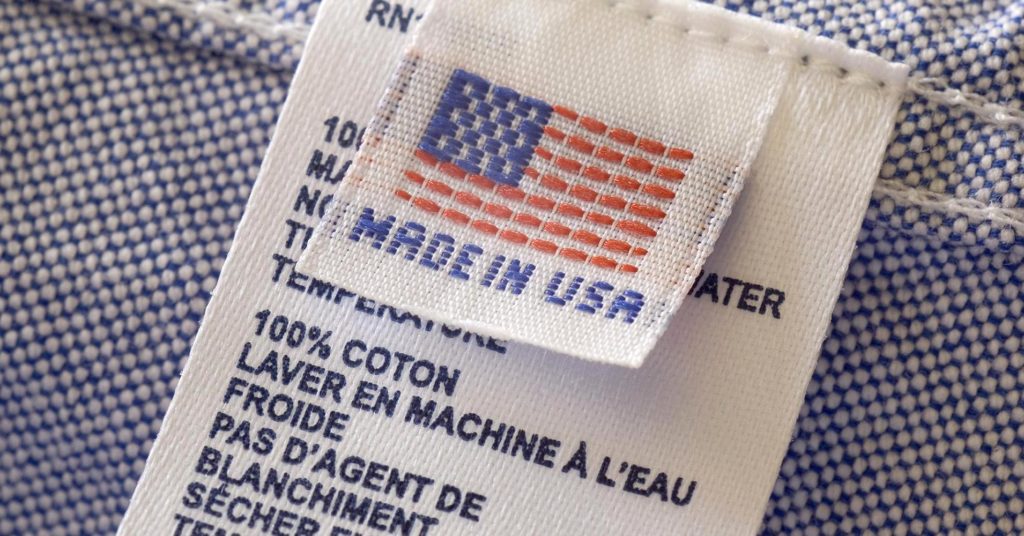Bradley Byrne: “Buy America” policies are good for Alabama

President Donald Trump recently devoted a week to celebrating the importance of “Made in America” products with special events at the White House. I was pleased to see the President shining a spotlight on the many first-class items produced here in the United States. I often meet with manufacturing leaders from across Alabama during their visits to Washington, D.C. or during visits to their facilities back in Alabama. We discuss issues affecting our state’s manufacturing industry, the importance of infrastructure investments, as well as policy ideas that will spur industry growth, create jobs, and boost our local economy. Iron and steel companies are often a key part of the conversation. While iron and steel manufacturing is not new to Alabama, we currently face challenges critical to the health of the industry. Alabama has a rich history of manufacturing, with iron and steel serving as a key backbone of our state’s economy. Manufacturing in Alabama currently accounts for over 252,000 jobs – 11.7 percent of the total employment in the state and 11.71 percent of the gross state product. More than 60,000 of these jobs are supported by the steel industry. But, with opportunities on the horizon, we can do better. As a member of Congress, I am constantly looking for solutions to improve job opportunities, expand local industries and support our future workforce. To accomplish this, we must implement pro-business policies that will strengthen the steel manufacturing industry and promote homegrown economic activity. In April, President Trump signed an executive order to “Buy America,” which aims to use American-made goods for taxpayer-financed infrastructure. Buy America has broad bipartisan support and ensures that we first look to U.S. manufacturers instead of overseas competitors. Buy America is a simple, commonsense policy: American tax dollars spent on public projects should stay in the states and support our national economy. We shouldn’t subsidize jobs overseas when cost-competitive and quality goods are available here. As we have continued discussions surrounding the need to improve our infrastructure, U.S. companies should have the first opportunity to supply materials used to build roads, bridges, ports, water systems and other critical infrastructure. Buy America preferences prevent us from relying on other countries, like China, for steel and other materials used for producing infrastructure and our national defense systems such as fighter jets, tanks and ships. These countries capitalize on excess steel production overcapacity and subsidized imports, creating a detrimental impact on the industry. That, along with tough environmental and labor regulations, make it critically important to support policies that promote local steel manufacturing. The impact of supporting the local steel industry goes far beyond the jobs related to the specific manufacturer. For every domestic steel manufacturing job, it has a seven-fold impact in the economy, creating jobs in the community beyond those directly employed. Alabama is home to some of the most advanced and best manufacturing facilities in the world as well as a talented, skilled workforce that can compete with anyone. With Buy America preferences, we have the opportunity to reward those efforts. While progress has been made, there is much work to be done. Alabama’s strong tradition of producing iron and steel has positioned our state for future growth. It is time we take positive action to support this sector by implementing policies that keep our jobs, tax dollars, and industries in Alabama. I am proud of the hardworking men and women who support Alabama’s steel industry, and I look forward to continuing to advance policies that create a positive impact for the industry and our economy. • • • Bradley Byrne is a member of U.S. Congress representing Alabama’s 1st Congressional District.
Alabama business roundup: Headlines from across the state – 11/6/15 edition

What’s happening to Girl Scout cookies in the Yellowhammer state? How did other markets close the deal with Uber? What’s Walter Energy having to auction off under its new agreement? What Alabama company got “Made In America” honors from Martha Stewart? Answers to those questions and more in today’s Alabama business roundup: AL.com: Price goes up on Girl Scout cookies in Alabama The price of those irresistible Girl Scout cookies is going up. Both the Girl Scouts of North-Central Alabama and the Girls Scouts of Southern Alabama are raising the cost of cookies by 50 cents to $4 a box for the 2016 season. The price, however, is still one of the lowest in the nation, said Hannah Wallace, director of marketing and communications for the Girl Scouts of North-Central Alabama, which represents troops in 36 counties. Some troops in east Massachusetts, California and Hawaii are now selling cookies for $5 a box, according to reports. “The last time the Girl Scouts of North-Central Alabama raised Girl Scout cookie prices was in 2007 when the four legacy councils merged together to create GSNCA,” Wallace said. “We are so excited to be able to offer our girls more profits, as well as use the increased cookie revenue to provide the Girl Scout leadership experience to girls across the state.” Meghan Cochrane, director of public relations and marketing for the Girl Scouts of Southern Alabama, said the council is raising prices for the first time in more than a decade due to rising ingredients and transportation costs. “The council has been absorbing these increases in cost, and now we must finally raise the price for a package to an even $4,” she said. “The increase allows us to maintain and expand our high-quality programming and services; we will be able to increase troop proceeds and rewards.” Mary Charles, interim chief executive officer for the Girl Scouts of North-Central Alabama, echoed those sentiments. “This increased revenue means we will be able to better support our volunteers,” she said. “One of our most important goals is to make it as easy as possible for adults to lead troops that build girls of courage, confidence and character, who make the world a better place. An increase in the price of Girl Scout Cookies will help provide increased financial resources to troops for program and service to their communities as well as revenue for the council administrative functions.” Councils set their own cookie prices and it’s generally based on baker costs, ingredient costs, market size and availability and shipping costs. Troop proceeds from Girl Scout cookie sales in Alabama are anywhere from 55 cents per package ($6.60 per 12-package case) to 90 cents per package ($10.80 per 12-package case), Wallace said. Proceeds are determined by a troop per girl average, she said. Troop per girl average is determined by the number of packages sold divided by the number of girls selling. After paying the baker, all proceeds stay within the local council. New ways to purchase cookies Scout troops will begin taking preorders in December and throughout the Christmas season. Official sales will begin in February. Toffee-tastic Girl Scout cookies, the first gluten-free cookie, will be available in higher quantities in Alabama this season, Wallace said. They will also sell for $4 a box. For the first time, troops in Alabama will sell cookies online. “Girls can sell their cookies online and send an invitation (to family and friends) to buy them online,” Wallace said, adding online orders will be shipped to the orders. If you have trouble finding cookies for sale in February, visit GirlScoutCookies.organd type in your zip code to find booth sales. Also, there’s an app for that. Download the Girl Scout cookie finder where you usually buy your smart phone apps. Birmingham Business Journal: Walter Energy to auction assets under new agreement Walter Energy Inc. on Thursday announced it has entered into an asset purchase agreement with a newly formed entity capitalized and owned by members of the firm’s senior lender group. The new company will acquire nearly all of Walter Energy’s assets in Alabama, according to a release from Walter Energy. The decision to sell its Alabama assets will allow the company to continue to move forward with its current restructuring. The agreement – filed with the Bankruptcy Court for the Northern District of Alabama – is in connection with a proposed, court-supervised auction process under section 363 of the bankruptcy code. The agreement consists of cash consideration of $5.4 million, a $1.25 billion credit bid of existing indebtedness and the assumption of certain liabilities. An asset sale was one of the options included in Walter Energy’s restructuring plan when it filed for Chapter 11 protection in July. During the process, hundreds of Walter employees have been laid off – with the most recent round of temporary layoffs impacting 265 employees of Jim Walter Resources at its No.7 Mine in Brookwood, which is company’s largest and most productive mining operation. Earlier this month, Walter Energy announced 129 workers at Jim Walter’s No. 4 mine in Brookwood would be laid off, as a result of poor market conditions. The downturn for Alabama met coal producers is a result of another substantial downturn in the steelmaking sector – which is a primary customer of Alabama met coal. As steelmakers transition to new technology– primarily in China, which is in the midst of a construction lag – met coal producers like Walter continue to struggle adapting to the volatile global market. While Walter’s struggles have had the most profound impact on the Alabama coal sector, the company is not the only Alabama coal firm reeling as a result of the economic downturn facing the coal industry. Cliffs Natural Resources recently announced plans to cut its workforce by about 50 percent at two mining sites – the Oak Grove Mine in Jefferson County and the Pinnacle Mine in West Virginia. North American Coal Corp. on Oct. 10 also announced layoffs when it officially closed its Jasper operations, which impacted 118 workers. Birmingham Business


